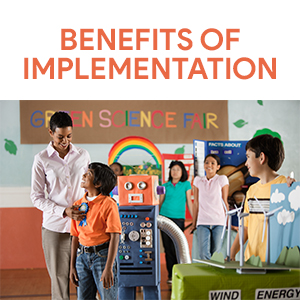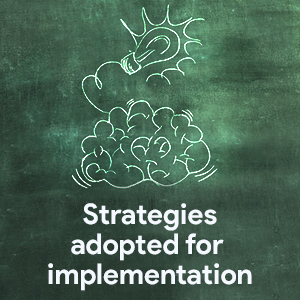The expansive Pune district in rural areas is home to the 3,639 schools and more than 11,000 instructors that make up the Pune Zilla Parishad. The Acharya Vinoba Bhave Sikshak Sahayak programme helps teachers apply 21st Century Education/NEP and enhance student learning outcomes.
This programme enhances teacher support by offering worksheets, weekly plans, and activities in the local tongue and context. All schools continuously achieve significant learning objectives and relative achievement disparities and implement new educational policies. Motivation and acknowledgement of teachers are one of the pillars of this programme. Teachers take pride in showcasing their work. Peer praise and management rewards serve to recognise the efforts of teachers.
It has improved coordination and communication for implementing programmes, receiving feedback, and evaluating results between teachers and various layers of administration, including CRC, BRC, DIET, etc. This facilitates teamwork and quick movement.
The core of the Vinoba initiative is a smartphone app where management and all school teachers must register. Each teacher is explicitly identified and associated with a UDISE code, which is part of the Ministry of Education's school database.
The objectives of this initiative are:
- To raise educational standards, which is essential to increase teacher engagement and motivation.
- To obtain voluntary participation and carry out the numerous adjustments recommended by NEP 2020.
- To increase engagement, social media platforms use techniques like gamification, likes, shares, notifications, and rewards.
- To determine the training requirements, infrastructure improvements, resource requirements for schools and kids with special needs, etc.,
- To honour the teachers who are working exceptionally well, awards are announced on a monthly basis.
The Vinoba programme aids in establishing alignment and boosts speed and effectiveness. We now have a booming community of more than 11,000 teachers from more than 3,400 schools.
Problems faced & people impacted during implementation:
With the help of Taluka heads (#13) and cluster heads (#309), management-envisioned programmes are carried out in almost 3,600 schools. A cluster is in charge of 10–15 schools. There are 200–500 schools each Taluka. There are schools in isolated rural locations. Most schools have only two to three teachers. Numerous grades and courses are frequently taught by one teacher. Other tasks, such as those involving special needs students, monthly parent meetings, enrolling out-of-school children, etc., take up a significant amount of time in addition to teaching.
Small schools' isolation is a problem. Teachers perform best in groups and as a team. Teachers require assistance and direction. They desire to belong to a group, be heard, and receive respect.
Benefits of implementation:
The benefits of implementation of this initiative are as mentioned below:
Teacher Support: 310 Weekly plans with specific learning objectives, activities, videos and other resources have been supplied to apply new teaching methods, close learning gaps, and implement NEP 2020. The TLM has had over 1 lac views.
Teacher Engagement and Motivation: In order to learn from one another, teachers have contributed more than 1,000 posts (TLM, student projects, experiences). There are seven district-level honours and more than fifty awards at various levels.
Monitoring and Compliance: Information is received from over 20,000 replies from several on-the-ground activities and school visits.

Features of the initiative:
The features of this initiative are highlighted below according to a few different dimensions:
Sustainability - The initiative has good bottom-up support and is integrated into DEIT, officials', and teachers' daily activities. The IIM Ahmedabad alumni network is providing financial assistance for the programme through donations. The programme should last for a very long period.
Scalability - The programme can be expanded to include more districts throughout the state. Additionally, the department of education's monitoring and analytics capabilities are growing.
Cost-Effectiveness: Over 3,600 schools in the district use the Vinoba programme. The programme maintenance cost for these is roughly Rs 1,500 per school each year.
Replicability - Other districts in Maharashtra and India might readily adopt the Vinoba initiative.
Transparency - Vinoba is a transparent platform. All community members have access to all content and activity on the forum. The district is not charged for the CSR-funded programme. Every programme that Vinoba is connected with is routinely watched over and audited at different levels.
Accountability - The DIET Head, who is the programme manager for Vinoba, is clearly responsible for the program's performance. The Open Links foundation, responsible for assisting the DIET head, is well-established.
Strategies adopted for implementation:

It is never easy to implement a technology programme on a broad scale. The programme must be introduced with top management support, but for it to last for a long time, it must also gain bottom-up acceptability.
- To give the programme a "Top Down" push -
- Organise district-wide events like teacher exams, Sikshan Parishad, SMC, etc., via the app.
- Run recurring apps like Sikshan Parishad, SMC and weekly lesson plans.
- Schedules for daily monitoring by special educators.
To give the programme "Bottom-up" wings-
- Permit teachers to exchange experiences on the platform and publish student projects.
- Run several tiers of the Post of the Month programme.
- Initiate a quiz programme on pedagogy, teaching, and learning.
- Share TLM and weekly lesson plans so that teachers may discover resources quickly.
The programmes and information are all seamlessly incorporated into daily operations, so neither the teachers nor the officers are overburdened. The initial goal was to make sure teachers enjoy attending the platform and are not concerned about complying. Groups on WhatsApp and a helpline were also created to support district-level administrators and teachers.

